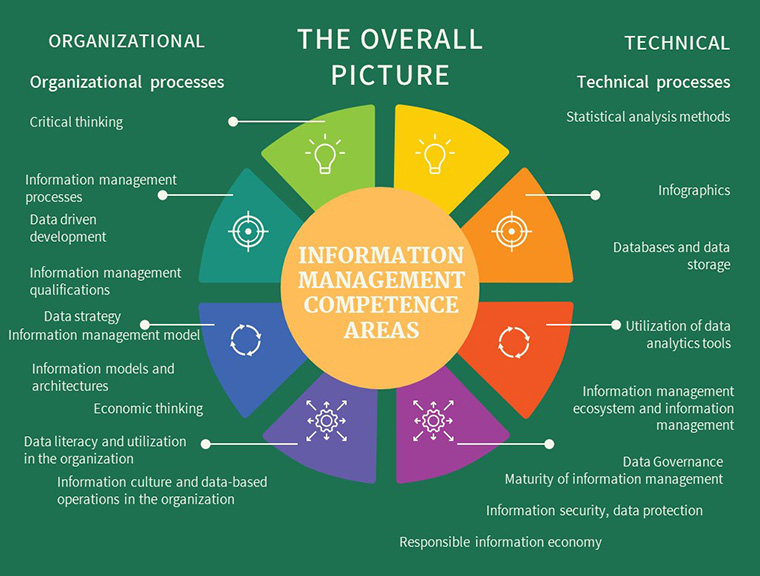
Heli Bergström
In the modern business world, understanding information and data are considered basic civic skills. However, there are large gaps in knowledge for many people across different sectors. The educational entity created in the project utilizes teaching technology, environments, and analytics to make pedagogy more accessible and inclusive, which are still not used enough in teaching planning.
The increased need to develop data-driven leadership training
As we know, the world is changing rapidly, and many change processes are increasingly complex and difficult to grasp. Complex environments are marked by uncertainty. This means that leaders must learn new kinds of knowledge and skills to understand and deal with such complex phenomena. (Kangas et al. 2019, 7.) As Kangas et al. (2019, 7) explain, “This emphasizes the capacity to embrace uncertainty and use various sources of information and knowledge to create a shared understanding of the situation at hand”. One of the skills that needs to be improved is data literacy.
The need for expertise in the utilization of data and information has been identified in the Competence Structure 2035 report, commissioned by the Finnish national agency for education (Leveälahti et al. 2019). There is a growing urgent need for data expertise, as there is a significant skills shortage in the field. The inability to utilize information (e.g., Gartner 2023) and the fact that the available data is not well linked to organizational operations has been identified as the biggest obstacle in the field.
Meeting the necessary data literacy competence requirements necessitates an investment in training and teaching materials. There is a clear need for learning material in Finland since textbooks in the field are over 10 years old. The field has developed during this time and self-study material is outdated.
The goal of the project
The project TieJot (TieJot is an abbreviation of Tiedolla johtamisen osaajakoulutuksella tuottavuutta työelämään that mean ‘Productivity in working life’ and ‘data-driven leadership skills training’) aims to develop data-driven teaching methods by applying and experimenting with new innovative teaching technology and digital pedagogical methods. The joint development utilizes the partners’ specialized expertise. At the same time, the shared competences of the entities are deepening. Although the aim is to be experimental, a core purpose of the project is the scalability and long-term usability of the results.
The goal is to develop inclusive teaching methods for data-driven leadership. We aim for more detailed pedagogical competence by analyzing the effect of various performance opportunities and learning materials on competence, motivation, deep knowledge, and effectiveness of teaching various students. We will use and test, for example, learning badges and multimedia learning material, e.g., high-quality videos, podcasts, external experts, and a multi-seat classroom.
The goal of the project is to increase openly available study material. The project contributes to the broader development of the field of data-driven leadership in Finland. The teaching of continuous learning is currently fragmented. The field is very broad, and even the definitions of concepts still require clarification. The field includes ontology, technical and software expertise, statistical analysis, and information utilization expertise. The industry needs cooperation to develop and achieve unified overall views of different areas.
Data-driven leadership training helps employers and employees respond to new organizational competence needs or anticipate changes.
Definition of data-driven leadership
Essentially, data-driven leadership is the utilization of general digital skills, which include, but are not limited to, e.g., data literacy, processing, utilization and understanding of artificial intelligence and learning analytics. Data-driven leadership is part of the larger whole of information management. Information management deals with and studies information-based value creation and, as a result, increases an organization’s ability to create value with information. Within the context of information management, information is broadly understood as an intangible asset that includes all other intangibles, such as know-how, storable information, and so on.
Information management is a multidisciplinary field and is divided into several different themes. At the main level, there are two themes: data-driven leadership and management of information. (Hurri & Bergström 2023.) Figure 1 illustrates organizational and technical processes of information management.

The goal of data-driven leadership is to improve decision-making by basing decisions on facts. The key is to acquire data that is needed in leadership and process it into a suitable form for decision-making. Management of information, on the other hand, examines the management of information within an organization. The typical themes of management of information are processes related to information or methods for preserving information. The latter covers a wide range of methods and tools, from information technology to leadership. (Hurri & Bergström 2023.)
The new training model and learning design methods
The project expands the current data-driven leadership training offering into a more compact entity than before and comprises a part of the continuous learning offering. In the project, a generic training model for data-driven leadership is piloted, which utilizes and develops new solutions in digital pedagogy. It is created in a learner-centered way using learning design. The model and implementation are developed iteratively based on learning analytics and feedback. The training is carried out independently online. Figure 2 illustrates the data-driven leadership training model.

The project uses student-oriented learning design methods. We will use learning analytics in the development of pedagogy from the perspectives of teachers’ and students’ work. We will also analyze the effect of learning badges on students’ motivation and employers’ interest. A student can use the achievements from the project in their other higher education studies as well. The studies are created at the EQF-7 level. In the project, experiments and investigations are carried out to teach data-driven leadership. With learning analytics, different learner profiles and study niches are investigated.
The project tests Multi Locational Classroom implementations as day courses. In two experiments, the pedagogical solutions required by teaching technology are developed. The project produces a 30-credit educational unit, which will be offered as modules and/or courses as part of the continuous learning offered by universities of applied sciences. The educational unit complies with the Digivision 2030 strategy.
Benefits for students and teachers
With the help of data-driven leadership training, employers and the employees can respond to new organizational competence needs or anticipate changes in the organizational economic structure. With the new skills developed in this training, it is possible to develop individual methods of working or the data activities of an organization. Further, it allows the discovery of new business opportunities or managing and developing company operations, such as financial forecasting.
With the help of learning analytics, students learn to use data-driven leadership and related tools to support their activities. Teachers learn to use learning analytics as a tool for developing their own teaching. An analysis is conducted of the effects of utilizing learning analytics, the results of which are published on various open publication channels. The publications analyze study paths in terms of the pedagogical needs of the target groups.
The project reduces the shortage of experts in the field and guides new experts to the specialized fields of data-driven leadership. For entrepreneurs, the new know-how brings two kinds of opportunities: 1) developing their own company’s operations and 2) creating new data-driven products and services. The project increases the knowledge of general digital skills throughout the entire population.
In the project, new teaching materials are created, especially related to data literacy and the development of data-driven leadership to be more productive. The project’s teachers will write a textbook together. Publications are also made about the pedagogical implementation and evaluation results. In addition, the project plans and develops open digital learning material focusing on the basics of data literacy to support online learning.
The project promotes the social inclusiveness of the field of data-driven leadership. The heterogeneity of the general workforce is important so that the results of information and analysis do not distort the development of society. The project increases the generic competencies of experts in data-driven leadership, supports sustainable development through the improvement of data-driven leadership skills, produces open information in the form of publications and learning materials, improves the accessibility of education in the field, and increases its inclusiveness.
Future development challenge
In Finland, there is currently no degree-independent and comprehensive supply of continuous learning for data-driven leadership that meets the demands of labor market. It is planned that the training model and study courses develop in the project will meet the continuous learning need even after the pilot has ended.
The field of data-driven leadership is developing in Finland. The training model offers more extensive, flexible, and degree-independent data-driven leadership training than the current offering for working people, entrepreneurs, and those planning to change fields. The benefits for all stakeholders are undeniable. However, our project is only one project among others, but the expectations of its societal impact are relatively high. The need to develop data-driven leadership and related training remains.

Heli Bergström, Dr. Sc. Tech., Principal Lecturer, Digital Business, South-Eastern Finland University of Applied Sciences, Xamk, heli.bergstrom(at)xamk.fi.
References
Gartner. 2023. Top strategic technology trends 2023. [https://www.gartner.com/en/information-technology/insights/top-technology-trends].
Hurri, P. 2023. Tietojohtaminen ja data-analytiikka – osaajakoulutus koulutuksen kehittäjänä. Forthcoming in Bergström, H. (ed.) (2023). Tietojohtamisesta opetussuunnitelmiin ja pedagogisiin ratkaisuihin. South-Eastern Finland University of Applied Sciences publications.
Hurri, P. & Bergström, H. 2023. TieJot mahdollistaa opetuksen ja oppimisen kehittämisen. Xamk READ. Vol. 2/2023. [https://read.xamk.fi/2023/koulutus/tiejot-mahdollistaa-opetuksen-ja-oppimisen-kehittamisen/].
Kangas, A., Kujala, J., Lönnqvist, A., Heikkinen, A. & Laihonen, H. 2019. Introduction: Leadership for dealing with complex changes. In: Kangas, A., Kujala, J., Heikkinen, A., Lönnqvist, A., Laihonen, H. & Bethwaite, J. (Eds.) 2019. Leading change in a complex world. Transdisciplinary perspectives. [https://urn.fi/URN:ISBN:978-952-03-0845-2].
Leveälahti, S., Nieminen, J., Nyyssölä, K., Suominen, V. & Kotipelto, S. (Eds.) 2019. Osaamisrakenne 2035. Alakohtaiset tulevaisuuden osaamistarpeet ja koulutuksen kehittämishaasteet – osaamisen ennakointifoorumin ennakointituloksia. Opetushallituksen raportit ja selvitykset 2019:14. [https://www.oph.fi/fi/tilastot-ja-julkaisut/julkaisut/osaamisrakenne-2035].
Soininen, T. 2023. Tietojohtamisen osaamisalueet. TieJot-projektin materiaaleja.
Abstract
The goal of this article is to present and discuss the benefits of data-driven leadership training. In Finland, there is currently no degree-independent continuous learning for data-driven leadership that meets the demand or anticipated future needs. In our project, we pilot a generic training model for data-driven leadership, which utilizes and develops new innovative digital pedagogy solutions.
Data-driven leadership systematically utilizes analyzed data in various decision-making, selection, and operational control situations. Data-driven leadership can develop the efficiency and productivity of organizations and enable innovations, digital services, and business models. Further, data-driven leadership can improve the well-being of personnel and the customer experience.
With the help of data-driven leadership training, employers and the employees can respond to new organizational competence needs or anticipate changes in the economic structure of the company. With the new skills improved in this training, it is possible to develop individual methods of working or the data activities of an organization. Further, it allows the discovery of new business opportunities or managing and developing company operations, such as financial forecasting.



